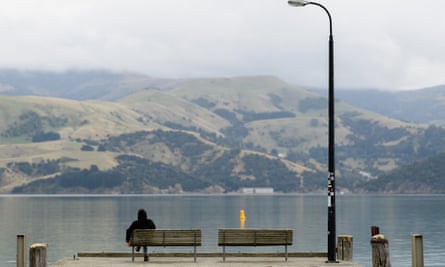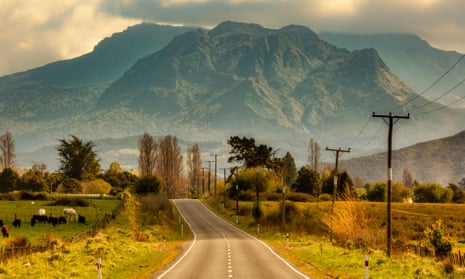In the age of coronavirus, New Zealand can seem like an idyll: a tightly sealed hermit kingdom, recently rated best place to survive global societal collapse, and one of the last countries in the world to evade incursions from the Delta variant. But the walls of fortress New Zealand aren’t only successful at keeping out Covid-19.
With demand for government-required quarantine greatly exceeding the supply of spaces, desperate New Zealanders are going to enormous lengths – employing bots, coders, and $2000 booking assistants – to try to secure entry to the country. For many, the emotional and psychological toll is enormous.
Profiting from desperation
It is 1.15AM in Dubai, and Alan Rowlands is once again at his computer. The ritual of endlessly refreshing a booking screen in hope of securing a spot in managed isolation has consumed all of his waking moments for the past three weeks. “It’s so demoralizing,” he says. “There’s just nothing.”
Rowlands and his wife are in Dubai. Several weeks ago, his employment contract ended unexpectedly – and with it, his visa. Soon, he will become an illegal overstayer, and on top of having no income, he will face significant fines for his visa violation.
New Zealand has protected its Covid-free status with extremely strict border controls, requiring returnees to spend two weeks in a government-run Managed Isolation and Quarantine Facility [MIQ]. The stay is time-consuming and often expensive in itself – but expats say the true barrier is securing a booking at all. At present, all available dates are booked. New spaces made available after cancellations disappear within seconds.
The system does not distinguish between people who have been trying to book a space for months, and those booking for the first time – the spoils go to the fastest fingers. “I’m on there 24/7,” Rowlands says. “You have to just keep refreshing it and refreshing it and refreshing it, in the hope that something will come up.”
What's it like applying for quarantine in New Zealand? I made a video of 100 attempts to secure a spot. Almost got there once. pic.twitter.com/vPlnZzTSoS
— Jonathan Brewer 🇳🇿🇸🇬💉💉 (@kiwibrew) July 9, 2021
Rowlands has tried a variety of methods: initially, he signed up for bots – online services that scan for available dates, and send alerts when they arrive. Each time one came up, it disappeared before he could click through. He approached people branding themselves as “MIQ assistants” – whom you pay to watch the site constantly, or run computer scripts to book on your behalf. Three turned him down. They were all overwhelmed with work, and had significant client waiting lists.
His problem is shared by thousands of overseas New Zealanders who, in recent months, have found passage home increasingly hard to secure. Online, a cottage industry has sprung up to meet the demand, with one site charging up to $2,415 for their services. The Guardian also viewed advertisements on Fiverr, where a range of sellers were charging between $150 and $300 to secure a space – one of whom had a waitlist of 152 people.
One woman has elderly parents in Switzerland, but was now unable to leave the country to visit them. People “are desperate to come home – it is an absolute disgrace they can’t return unless paying a ridiculous amount to absolute strangers who then also hold your passport number and information,” she said.
“The government is forcing so many into … transactions with some shady operators who are making a very healthy profit out of people’s desperation.”
A psychological toll
Facebook support groups with thousands of members have sprung up, with people swapping tips and strategies for securing a spot. Over time, they have become a source of emotional and mental health support, as well as logistics – even a brief scroll through the pages pulls up dozens of stories of people separated from terminally ill family members, laid-off workers with no financial support, parents separated from children. Many say the process has taken a significant toll on their mental health, and some report feeling anxious, depressed, and suicidal.
“It’s shattering.” Rowlands says. “I’m literally tearing my hair out. Then I get people saying ‘oh well, you know, maybe you need to go to another country’. Where am I going to go?”
“We feel as though we’re being treated as pariahs, we feel like nobody wants us back.”

The Guardian received numerous messages from New Zealanders struggling to make a booking.
“I never could have imagined the broken system we have now,” one woman said, “My heart breaks for all the people who have been trying for months to return & often under very painful circumstances. At this point, I feel my anxiety growing, wondering when I’ll see my ageing mother again.”
“My father has bowel cancer and he will need surgery next week,” wrote another. Others relayed stories of being separated from their children, attempting to get parents home for surgeries, or forced into illegal visa status because they could not get home.
Cherie Brown, a lecturer based in Japan, is 66 and is trying to return home to retire. For now, she sits refreshing the site every 7 seconds – “faster than that and the system will identify you as a bot and block you,” she says. She has been self-isolating at home for nearly 18 months.
None of those interviewed objected to the requirement to quarantine itself – only to the current booking system.
Supply chains expert professor Tava Olsen said research showed queues caused psychological stress. That toll was exacerbated, she said, by uncertainty, length of time, and unfairness – such as queue-jumping – all of which were present in the current booking system.
Olsen suggested that the government create a “high priority” cohort for people who were moving home, or affected by illness and family separation, and recommended a waitlist, which – while it may be long – would give people certainty to plan ahead.
A spokesperson for the Ministry of Business, Innovation and Employment said in a statement that “MIQ has served New Zealand well, helping to bring more than 158,000 people here, while protecting the freedoms that we all now enjoy.”
“Demand for space in managed isolation facilities is always high, and there is finite capacity within the MIQ system, and that’s for good reason – Covid-19 is raging around the world and we need to keep New Zealand safe.”
The spokesperson said they had implemented measures to prevent bots making bookings, and that if people chose to employ third parties to book, “we advise they make sure it is a reputable person or company,” and warned that sharing login details was a breach of rules.
They added that a waitlist was “under consideration” but would be “complex” and “pushes the problem further up the pipeline – it would not guarantee people vouchers, it would only save their place in a queue, where demand is still significantly greater than supply”.
Claire Sisam, a lawyer in Barcelona, has been attempting to secure a spot for three months. “I don’t want to sound dramatic but I cry about it sometimes. I haven’t seen my parents since February 2020 and it frightens me because if something happens to them, I can’t get to them,” she says.
Those that do tell their stories say they are sometimes met with vitriol online, or a lack of understanding from the New Zealand public. “I think there’s a lack of empathy and it feels like it’s becoming them and us,” Sisam says. “I just feel like we’re rendered stateless – we have no country.”
